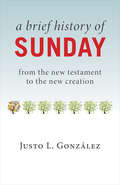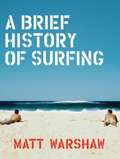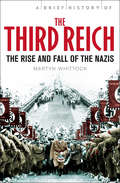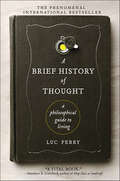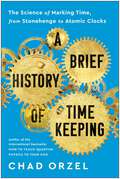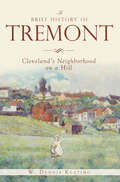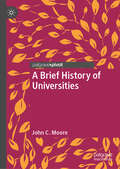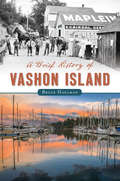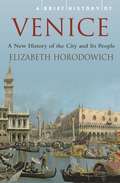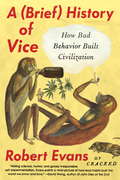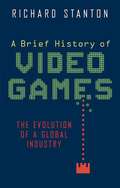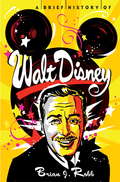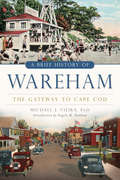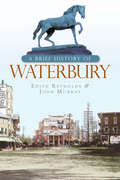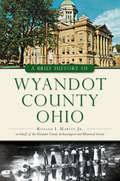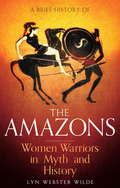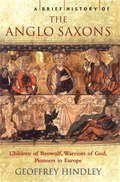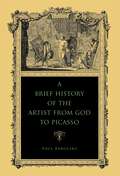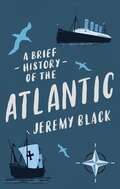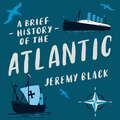- Table View
- List View
A Brief History of Sunday: From the New Testament to the New Creation
by Justo L. GonzálezIn this accessible historical overview of Sunday, noted scholar Justo González tells the story of how and why Christians have worshiped on Sunday from the earliest days of the church to the present. After discussing the views and practices relating to Sunday in the ancient church, González turns to Constantine and how his policies affected Sunday observances. He then recounts the long process, beginning in the Middle Ages and culminating with Puritanism, whereby Christians came to think of and strictly observe Sunday as the Sabbath. Finally, González looks at the current state of things, exploring especially how the explosive growth of the church in the Majority World has affected the observance of Sunday worldwide. Readers of this book will rediscover the joy and excitement of Sunday as early Christians celebrated it and will find fresh, inspiring perspectives on Sunday amid our current culture of indifference and even hostility to Christianity.
A Brief History of Surfing
by Matt WarshawMatt Warshaw knows more about surfing than any other person on the planet, as evidenced by The History of Surfing, Warshaw's definitive take on the sport. Now, he has honed that book into an abridged and excerpted edition for surfers everywhere. Each spread features a micro essay alongside an image capturing a slice of surf history, from Kelly Slater and the invention of the thruster to shark attacks and localism. Packaged in a small and chunky hardcover, A Brief History of Surfing deftly defines surf culture in an entertaining and irresistible volume with wide appeal.
A Brief History of The Third Reich: The Rise And Fall Of The Nazis (Brief Histories )
by Martyn WhittockBeginning in the broken aftermath of the First World War and the Treaty of Versailles that made German recovery almost impossible, Whittock tells not just the account of the men who rose to the fore in the dangerous days of the Weimar republic, circling around the cult of personality generated by Adolf Hitler, but also a convincing and personality-driven overview of how ordinary Germans became seduced by the dreams of a new world order, the Third Reich. The book also gives a fascinating insight into the everyday life in Germany during the Second World War and explores key questions such as how much did the Germans know about the Holocaust and why did the regime eventually fail so disastrously?
A Brief History of The Third Reich: The Rise and Fall of the Nazis (Brief Histories)
by Martyn WhittockThe abuse of power, genocide, the destruction of total war, unimaginable cruelty and the suffering of millions were all central features of Hitler's Nazi regime. Yet the Nazis were also highly successful in manipulating images and information: they mobilized and engaged vast numbers of people, caught the imagination of the young and appeared remarkably modern to many contemporary observers.Was the Third Reich a throwback to a mythical past or a brutally modern and technologically advanced state? Was Hitler a strong dictator who achieved his clear goals, or was his chaotic style of government symptomatic of a weak dictator, unable to control the complex and contradictory forces that he had unleashed? Was the Third Reich ruled by terror, or largely supported by a compliant German population? Was the genocide against the Jews a peculiarly German phenomenon, or a uniquely German expression of a terrible wider trend?Whittock explores these and other key questions, interrogating the views of different historians and drawing on a wealth of primary sources - from state-sponsored art to diaries, letters and memoirs of both perpetrators and victims - to provide an overview of the complex evidence. History should aim to put us firmly in touch with the lives of people living in the past and the issues they faced. Whittock never loses sight of the individuals whose lives were caught up in these extraordinary events, while also giving a lucid overview of the bigger picture.
A Brief History of Thought: A Philosophical Guide to Living (Learning to Live)
by Luc Ferry“Succinct and accessible” this international bestselling survey is “perfect for anyone who wants to dip their toe into the waters of philosophy” (Matt Haig, Washington Post).From the timeless wisdom of the ancient Greeks to Christianity, the Enlightenment, existentialism, and postmodernism, Luc Ferry’s instant classic brilliantly and accessibly explains the enduring teachings of philosophy—including its profound relevance to modern daily life and its essential role in achieving happiness and living a meaningful life. This lively journey through the great thinkers will enlighten every reader, young and old.“This superb primer is proof that philosophy belongs at the center of life.” —Publishers Weekly, starred review“Ferry's openness, energy, and charm as a teacher burst through on every page. However difficult the questions he poses, his eagerness to find answers, to justify philosophy as a way of life, is infectious.” —Wall Street Journal“For everyone from the man in the street to the man in the Acropolis—a fine introduction to philosophy and its fundamental relevance to living a meaningful life.” —Thomas Cathcart and Daniel Klein, New York Times–bestselling authors of Plato and a Platypus Walk into a Bar“This is a vital book. Luc Ferry rehabilitates the ancient question, ‘What is the best way of life?’ as though our lives depended on it.” —Matthew B. Crawford, New York Times–bestselling author of Shop Class as Soulcraft“No dry academic, Ferry restores to philosophy a compelling urgency.” —Booklist, starred review
A Brief History of Timekeeping: The Science of Marking Time, from Stonehenge to Atomic Clocks
by Chad Orzel2022 NATIONAL INDIE EXCELLENCE AWARDS WINNER — HISTORY: GENERAL ". . . inherently interesting, unique, and highly recommended addition to personal, professional, community, college, and academic library Physics of Time & Scientific Measurement history collections, and supplemental curriculum studies lists.&” —Midwest Book Review "A wonderful look into understanding and recording time, Orzel&’s latest is appropriate for all readers who are curious about those ticks and tocks that mark nearly every aspect of our lives." —Booklist &“A thorough, enjoyable exploration of the history and science behind measuring time.&” —Foreword Reviews It&’s all a matter of time—literally. From the movements of the spheres to the slipperiness of relativity, the story of science unfolds through the fascinating history of humanity&’s efforts to keep time. Our modern lives are ruled by clocks and watches, smartphone apps and calendar programs. While our gadgets may be new, however, the drive to measure and master time is anything but—and in A Brief History of Timekeeping, Chad Orzel traces the path from Stonehenge to your smartphone. Predating written language and marching on through human history, the desire for ever-better timekeeping has spurred technological innovation and sparked theories that radically reshaped our understanding of the universe and our place in it. Orzel, a physicist and the bestselling author of Breakfast with Einstein and How to Teach Quantum Physics to Your Dog continues his tradition of demystifying thorny scientific concepts by using the clocks and calendars central to our everyday activities as a jumping-off point to explore the science underlying the ways we keep track of our time. Ancient solstice markers (which still work perfectly 5,000 years later) depend on the basic astrophysics of our solar system; mechanical clocks owe their development to Newtonian physics; and the ultra-precise atomic timekeeping that enables GPS hinges on the predictable oddities of quantum mechanics. Along the way, Orzel visits the delicate negotiations involved in Gregorian calendar reform, the intricate and entirely unique system employed by the Maya, and how the problem of synchronizing clocks at different locations ultimately required us to abandon the idea of time as an absolute and universal quantity. Sharp and engaging, A Brief History of Timekeeping is a story not just about the science of sundials, sandglasses, and mechanical clocks, but also the politics of calendars and time zones, the philosophy of measurement, and the nature of space and time itself. For those interested in science, technology, or history, or anyone who&’s ever wondered about the instruments that divide our days into moments: the time you spend reading this book may fly, and it is certain to be well spent.
A Brief History of Tremont: Cleveland’s Neighborhood on a Hill (Brief History)
by W. Dennis KeatingFor almost two centuries, the historic Tremont neighborhood has rested on a bluff overlooking Cleveland's industrial valley. The sleepy farming community was transformed in 1867, when Cleveland annexed it. Factories attracted thousands of emigrants from Europe, and industrialization gave rise to a class of wealthy businessmen. After the city prospered as a manufacturing center during World War II, deindustrialization and suburbanization fueled a huge population loss, and the neighborhood declined as highways cut through. The 1980s marked the beginning of the rebirth of the cultural treasure Tremont became. Author W. Dennis Keating chronicles the challenges and triumphs of this diverse and vibrant community.
A Brief History of Universities
by John C. MooreIn this book, John C. Moore surveys the history of universities, from their origin in the Middle Ages to the present. Universities have survived the disruptive power of the Protestant Reformation, the Scientific, French, and Industrial Revolutions, and the turmoil of two world wars—and they have been exported to every continent through Western imperialism. Moore deftly tells this story in a series of chronological chapters, covering major developments such as the rise of literary humanism and the printing press, the “Berlin model” of universities as research institutions, the growing importance of science and technology, and the global wave of campus activism that rocked the twentieth century. Focusing on significant individuals and global contexts, he highlights how the university has absorbed influences without losing its central traditions. Today, Moore argues, as universities seek corporate solutions to twenty-first-century problems, we must renew our commitment to a higher education that produces not only technicians, but citizens.
A Brief History of Vashon Island (Brief History)
by Bruce HaulmanReachable only by ferry, Vashon Island is a breathtaking rural retreat from the bustling activity of nearby Seattle and Tacoma. The island's first inhabitants, the sx???babš, took advantage of its evergreen forests and rich marine resources. In 1792, George Vancouver was the first Anglo to discover the island and named it after Captain James Vashon. By the late 1800s, the first white settlers had established farms and greenhouses that supplied nearby cities with berries, tomatoes and cucumbers. Ferries drove development in the later half of the century, introducing new industries and tourism to the area. While both influenced by and isolated from the mainland, the island developed its own unique character treasured by locals. Merging human and natural history, author Bruce Haulman presents the rich heritage of this thriving community.
A Brief History of Venice
by Elizabeth HorodowichIn this colourful new history of Venice, Elizabeth Horodowich, one of the leading experts on Venice, tells the story of the place from its ancient origins, and its early days as a multicultural trading city where Christians, Jews and Muslims lived together at the crossroads between East and West. She explores the often overlooked role of Venice, alongside Florence and Rome, as one of the principal Renaissance capitals. Now, as the resident population falls and the number of tourists grows, as brash new advertisements disfigure the ancient buildings, she looks at the threat from the rising water level and the future of one of the great wonders of the world.
A Brief History of Venice (Brief Histories)
by Professor Elizabeth HorodowichIn this colourful new history of Venice, Elizabeth Horodowich, one of the leading experts on Venice, tells the story of the place from its ancient origins, and its early days as a multicultural trading city where Christians, Jews and Muslims lived together at the crossroads between East and West. She explores the often overlooked role of Venice, alongside Florence and Rome, as one of the principal Renaissance capitals. Now, as the resident population falls and the number of tourists grows, as brash new advertisements disfigure the ancient buildings, she looks at the threat from the rising water level and the future of one of the great wonders of the world.
A Brief History of Vice: How Bad Behavior Built Civilization
by Robert Evans"Mixing science, humor, and grossly irresponsible self-experimentation, Evans paints a vivid picture of how bad habits built the world we know and love."--David Wong, author of John Dies at the EndHistory has never been more fun--or more intoxicating. Guns, germs, and steel might have transformed us from hunter-gatherers into modern man, but booze, sex, trash talk, and tripping built our civilization. Cracked editor Robert Evans brings his signature dogged research and lively insight to uncover the many and magnificent ways vice has influenced history, from the prostitute-turned-empress who scored a major victory for women's rights to the beer that helped create--and destroy--South America's first empire. And Evans goes deeper than simply writing about ancient debauchery; he recreates some of history's most enjoyable (and most painful) vices and includes guides so you can follow along at home. You'll learn how to: * Trip like a Greek philosopher. * Rave like your Stone Age ancestors. * Get drunk like a Sumerian. * Smoke a nose pipe like a pre-Columbian Native American.A celebration of the brave, drunken pioneers who built our civilization one seemingly bad decision at a time, A Brief History of Vice explores a side of the past that mainstream history books prefer to hide.From the Trade Paperback edition.
A Brief History of Video Games
by Richard StantonThis Brief History provides a unique look at the history and culture of video games, starting with the 1960s classics like Pong to modern favorites such as Grand Theft Auto V and Bioshock. Focusing on creative and scientific advances between 1962 and today, A Brief History of Video Games offers a global perspective on gaming's past and its cutting-edge future with the evolution of virtual reality, 3D graphics, and thought-interface technology. It also addresses the design process from concept to packaging, considers the influence of manga and anime, and explores the relationship between video games and movies.
A Brief History of Walt Disney (Brief Histories)
by Brian RobbBoth a fascinating account of Walt Disney’s own significant artistic creations, from the iconic Mickey Mouse to the groundbreaking Snow White in 1937, and an insightful history of the hugely successful entertainment behemoth he created, from Dumbo to Pixar’s Toy Story, as well as the hugely popular theme parks. But Disney’s dark side is also explored: his disputed parentage; industrial disputes; his work for the FBI; and his anti-Communist and allegedly racist and antisemitic views.The company Disney built is today stronger than ever, encompassing not only the ongoing legacy of Disney animation, but also acting as the guardian of other well-loved creative endeavours, such as Pixar, The Muppets, Marvel Comics and now Star Wars.Sections include ‘Before Mickey: The Road to the Mouse House’, covering from 1901 to 1945 – the creation of Mickey Mouse, the creation of the world’s first full-length animated feature film, the Golden Age of animation and Disney’s help for the American war effort, despite labour disputes; ‘Disney Studios: The Disney Genius’ – difficult times, theme parks and television, live-action movies, including Mary Poppins; ‘Animation’s Second Coming’, from the Lady and the Tramp to The Sword in the Stone, and Walt Disney’s death; ‘After Walt: The Disney Legacy’ – family attempts to keep the studio afloat, decline and the loss of lustre in the 1970s and 1980s; ‘Disney Resurgent’ – a triumphant rebirth under new management with Who Framed Roger Rabbit? The Lion King and other blockbuster hits; ‘From Eisner to Iger’ – the corporate battle for the soul of Disney; ‘Disney Goes Digital’ – from Pixar to Star Wars, via Marvel Comics and The Muppets, Disney buyy up other studios, themselves often enough inspired by the original.
A Brief History of Wareham: The Gateway to Cape Cod (Brief History)
by Michael J. VieiraWareham, Massachusetts--the Gateway to the Cape--is a small town steeped in rich history. The Wampanoags, or "People of the First Light," first used the area of Wareham as a summer home. Later, this area became part of the colonies' first permanent settlement, Plymouth. Since its incorporation in 1739, Wareham has persevered and flourished through the American Revolution, the War of 1812 and the Industrial Revolution. In the nineteenth century, the seaside town quickly became a tourist destination and experienced an early economic boom as salt works, manufacturing mills, ironworks, nail factories and cranberry harvesting developed in the region. With over fifty-four miles of scenic waterfront, Wareham has drawn travelers to its shores for centuries. Join author Michael J. Vieira as he deftly navigates the history of this vibrant community.
A Brief History of Waterbury
by John Murray Edith ReynoldsIn 1681, just twenty-eight humble log cabins built around a marshy green made up what is today Waterbury, Connecticut. The town flourished, and by 1850, its brass- and button-making industries welcomed the Industrial Revolution. When the call came for the Civil War and World Wars I and II, Waterbury gave generously: buttons, to adorn United States military uniforms; and young soldiers, to fight for freedom and become heroes. A Brief History of Waterbury details the ebb and flow of this Connecticut town, the climb to its height, the struggles through adversity and scandal and the glory of modern-day triumphs. In this endlessly intriguing account, authors Edith Reynolds and John Murray uncover the true reaches of Waterbury's dynamic spirit.
A Brief History of Wyandot County, Ohio (Brief History)
by Ronald I. Marvin Jr. Wyandot County Archaeological and Historical SocietyOnce home to the powerful Wyandotte Nation, Wyandot County emerged from lands surrounding the Grand Reserve. The landscape has evolved dramatically, from the backbreaking work of draining marshland to the creation of solar farms centuries later. The Mission Church, Indian Mill and Colonel Crawford Monument link the county to its rich heritage, and the Lincoln Highway connects it with the rest of the nation. The county has played host to General William Harrison, President Rutherford Hayes, Charles Dickens, Medal of Honor recipient Cyrus Sears and Neil Armstrong. Author Ronald I. Marvin Jr. explores several thousand years of Wyandot history from its earliest inhabitants to the set of the Shawshank Redemption.
A Brief History of the Amazons: Women Warriors in Myth and History (Brief Histories Ser.)
by Lyn Webster Wilde'Golden-shielded, silver-sworded, man-loving, male-child slaughtering Amazons,' is how the fifth-century Greek historian Hellanicus described the Amazons, and they have fascinated humanity ever since. Did they really exist? For centuries, scholars consigned them to the world of myth, but Lyn Webster Wilde journeyed into the homeland of the Amazons and uncovered astonishing evidence of their historic reality.North of the Black Sea she found archaeological excavations of graves of Iron Age women buried with arrows, swords and armour. In the hidden world of the Hittites, near the Amazons' ancient capital of Thermiscyra in Anatolia, she unearthed traces of powerful priestesses, women-only religious cults, and an armed, bisexual goddess - all possible sources for the ferocious women.Combining scholarly penetration with a sense of adventure, Webster Wilde has produced a coherent and absorbing book that challenges preconceived notions, still disturbingly widespread, of what men and women can do.
A Brief History of the Amazons: Women Warriors in Myth and History (Brief Histories)
by Lyn Webster Wilde'Golden-shielded, silver-sworded, man-loving, male-child slaughtering Amazons,' is how the fifth-century Greek historian Hellanicus described the Amazons, and they have fascinated humanity ever since. Did they really exist? For centuries, scholars consigned them to the world of myth, but Lyn Webster Wilde journeyed into the homeland of the Amazons and uncovered astonishing evidence of their historic reality.North of the Black Sea she found archaeological excavations of graves of Iron Age women buried with arrows, swords and armour. In the hidden world of the Hittites, near the Amazons' ancient capital of Thermiscyra in Anatolia, she unearthed traces of powerful priestesses, women-only religious cults, and an armed, bisexual goddess - all possible sources for the ferocious women.Combining scholarly penetration with a sense of adventure, Webster Wilde has produced a coherent and absorbing book that challenges preconceived notions, still disturbingly widespread, of what men and women can do.
A Brief History of the Anglo-Saxons
by Geoffrey HindleyStarting AD 400 (around the time of their invasion of England) and running through to the 1100s (the 'Aftermath'), historian Geoffrey Hindley shows the Anglo-Saxons as formative in the history not only of England but also of Europe. The society inspired by the warrior world of the Old English poem Beowulf saw England become the world's first nation state and Europe's first country to conduct affairs in its own language, and Bede and Boniface of Wessex establish the dating convention we still use today. Including all the latest research, this is a fascinating assessment of a vital historical period.
A Brief History of the Anglo-Saxons (Brief Histories)
by Geoffrey HindleyStarting AD 400 (around the time of their invasion of England) and running through to the 1100s (the 'Aftermath'), historian Geoffrey Hindley shows the Anglo-Saxons as formative in the history not only of England but also of Europe. The society inspired by the warrior world of the Old English poem Beowulf saw England become the world's first nation state and Europe's first country to conduct affairs in its own language, and Bede and Boniface of Wessex establish the dating convention we still use today. Including all the latest research, this is a fascinating assessment of a vital historical period.
A Brief History of the Artist from God to Picasso (G - Reference, Information and Interdisciplinary Subjects)
by Paul BarolskyIn A Brief History of the Artist from God to Picasso, Paul Barolsky explores the ways in which fiction shapes history and history informs fiction. It is a playful book about artistic obsession, about art history as both tragedy and farce, and about the heroic and the mock-heroic. The book demonstrates that the modern idea of the artist has deep roots in the image of the epic poet, from Homer to Ovid to Dante. Barolsky’s major claim is that the history of the artist is inseparable from historical fiction about the artist and that fiction is essential to the reality of the artist’s imagination.
A Brief History of the Atlantic (Brief Histories)
by Jeremy BlackThe Atlantic has borne witness to major historic events that have drastically shaped humanity with each crossing of its path. In this broad and readable book, Jeremy Black takes the reader through its evolution to becoming one of the most important oceans in the world.Black discusses the importance of the Atlantic in relation to world history as well as addressing topics such as those bravest to attempt to cross the ocean before Columbus, the beginnings of slavery from 1400-1600, the struggle for control between empires in the 1600s, the way technology adapted with steamships to telegraph cables, the battle of the Falkland, and the Cold War.Black also touches on the Atlantic we know today, and the struggles it faces due to urgent global issues including climate change, pollution, and the trials of the economic rise in the Indo-Pacific world. If you have ever yearned to know more about this famed and vital ocean, this clear and concise history will be a key read as one of the first of its kind on its evolution to becoming an established world ocean.
A Brief History of the Atlantic (Brief Histories)
by Jeremy BlackThe Atlantic has borne witness to major historic events that have drastically shaped humanity with each crossing of its path. In this broad and readable book, Jeremy Black takes the reader through its evolution to becoming one of the most important oceans in the world.Black discusses the importance of the Atlantic in relation to world history as well as addressing topics such as those bravest to attempt to cross the ocean before Columbus, the beginnings of slavery from 1400-1600, the struggle for control between empires in the 1600s, the way technology adapted with steamships to telegraph cables, the battle of the Falkland, and the Cold War.Black also touches on the Atlantic we know today, and the struggles it faces due to urgent global issues including climate change, pollution, and the trials of the economic rise in the Indo-Pacific world. If you have ever yearned to know more about this famed and vital ocean, this clear and concise history will be a key read as one of the first of its kind on its evolution to becoming an established world ocean.
A Brief History of the Atlantic (Brief Histories)
by Jeremy BlackThe Atlantic has borne witness to major historic events that have drastically shaped humanity with each crossing of its path. In this broad and readable book, Jeremy Black takes the reader through its evolution to becoming one of the most important oceans in the world.Black discusses the importance of the Atlantic in relation to world history as well as addressing topics such as those bravest to attempt to cross the ocean before Columbus, the beginnings of slavery from 1400-1600, the struggle for control between empires in the 1600s, the way technology adapted with steamships to telegraph cables, the battle of the Falkland, and the Cold War.Black also touches on the Atlantic we know today, and the struggles it faces due to urgent global issues including climate change, pollution, and the trials of the economic rise in the Indo-Pacific world. If you have ever yearned to know more about this famed and vital ocean, this clear and concise history will be a key read as one of the first of its kind on its evolution to becoming an established world ocean.
